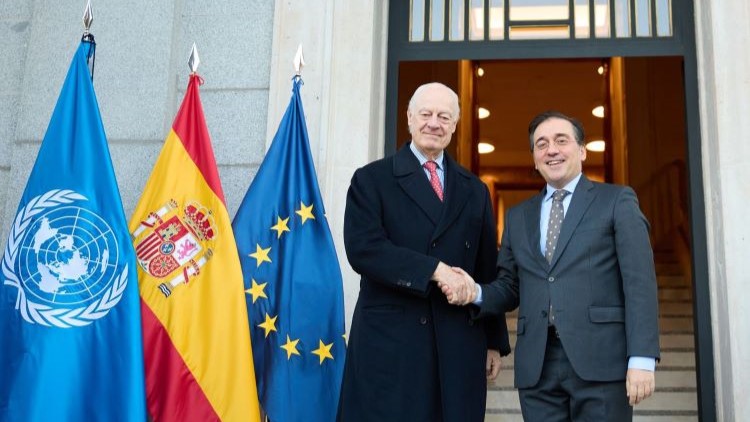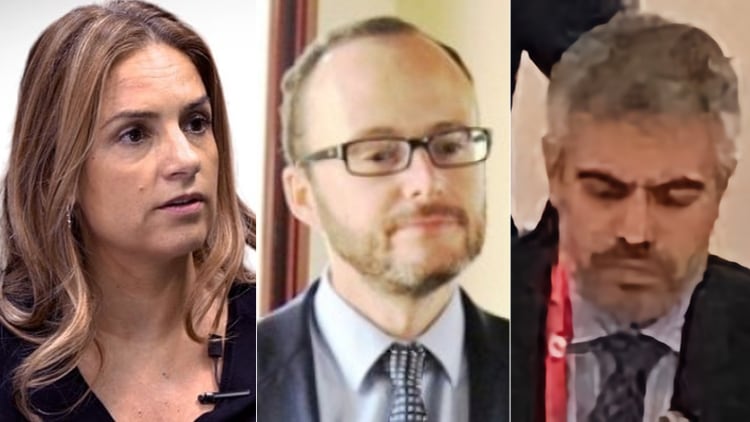Eduardo González
The Minister of Foreign Affairs, José Manuel Albares, held yesterday in Madrid his sixth bilateral meeting with the special envoy of the Secretary General of the United Nations for Western Sahara, Staffan de Mistura, a few days after staging in Rabat a new chapter of the ‘honeymoon’ that Spain and Morocco are living after the unexpected decision of the Government to recognize the Moroccan autonomy plan for the former Spanish colony.
“I have met again with Staffan de Mistura, personal envoy of the UN Secretary General for Western Sahara, at the Ministry of Foreign Affairs in Madrid. He has the full support of the Government of Spain in his work”. This was the very brief message transmitted yesterday by Albares through his official account on the social network X. The Diplomat tried to gather more information about the meeting through the Ministry and the United Nations, but did not obtain any result.
De Mistura arrived yesterday in Madrid as part of his third working tour since he took office, during which he first visited Dakhla and Laayoune in Western Sahara. In July 2022, the special envoy did not have permission from Rabat to visit these two cities.
The meeting took place only four days after Albares made a working visit to Morocco, the first of the new legislature. During the joint press conference in Rabat, Moroccan Foreign Minister Nasser Bourita assured that Spain’s position on the Western Sahara issue “has not changed” and remains “as already expressed” in the Joint Declaration of April 7, 2022 and in the Declaration of the twelfth Morocco-Spain High Level Meeting (RAN), held in February 2023. The Joint Declaration of April 2022, agreed by King Mohamed VI and the Prime Minister, Pedro Sanchez, states that “Spain considers the Moroccan autonomy initiative, presented in 2007, as the most serious, realistic and credible basis for the resolution of this dispute.”
On the same Thursday, Abdulah Arabi, Polisario Front representative in Spain, released a press statement in which he stated that Pedro Sanchez “still has the power to reverse the situation, to unambiguously support the work of Mr. De Mistura as special envoy of the UN Secretary General and to stop interfering in the inalienable right to self-determination and independence of the people of Western Sahara”. The change of position on Western Sahara has been rejected not only by the entire parliamentary opposition, but even by the minority partners of the coalition government, Unidas Podemos at the time and Sumar at present.
Third meeting since the flip-flop
Yesterday’s was the sixth meeting between Albares and De Mistura since October 2021, when the Italian-Swedish diplomat was appointed to a post that had remained deserted for two and a half years, and the third meeting between the two since March 2022, when Pedro Sanchez made his surprising about-face in Spain’s traditional Western Sahara policy. Only two months before this change, and almost coinciding with another visit of De Mistura to Spain, Morocco’s Prime Minister Aziz Akhnnouch declared that if Madrid wanted to improve its then very deteriorated relations with Rabat it should, at the very least, do the same as Germany had done, which had described the Moroccan proposal for autonomy for Western Sahara as “a good basis” for achieving peace in the area.
In October 2022, Albares received De Mistura at the Palacio de Viana, before whom he recalled recent words of Pedro Sanchez before the UN General Assembly in which he supported the work of the special envoy, without making any mention of his spin on Western Sahara. The two met again in February 2023 on the margins of the Munich Security Conference, where the minister repeated his usual message: “I have once again reiterated to him that he has the full support of the Spanish government in his work”.
Last October, the UN Secretary General, António Guterres, called before the Security Council for the involvement of “all concerned” in the Western Sahara conflict in order to put an end to the dispute without preconditions and taking into account common interests. The expression “all concerned” was introduced by De Mistura himself to try to unblock the negotiations. The Polisario Front is demanding two-party talks between independence supporters and Moroccans, while Rabat is calling for a tripartite negotiation that would also include the Polisario’s great ally (and Morocco’s great regional rival), Algeria.







